Blog Archives
‘Water for Elephants’ a Sensational, Poignant, Uplifting Spectacle
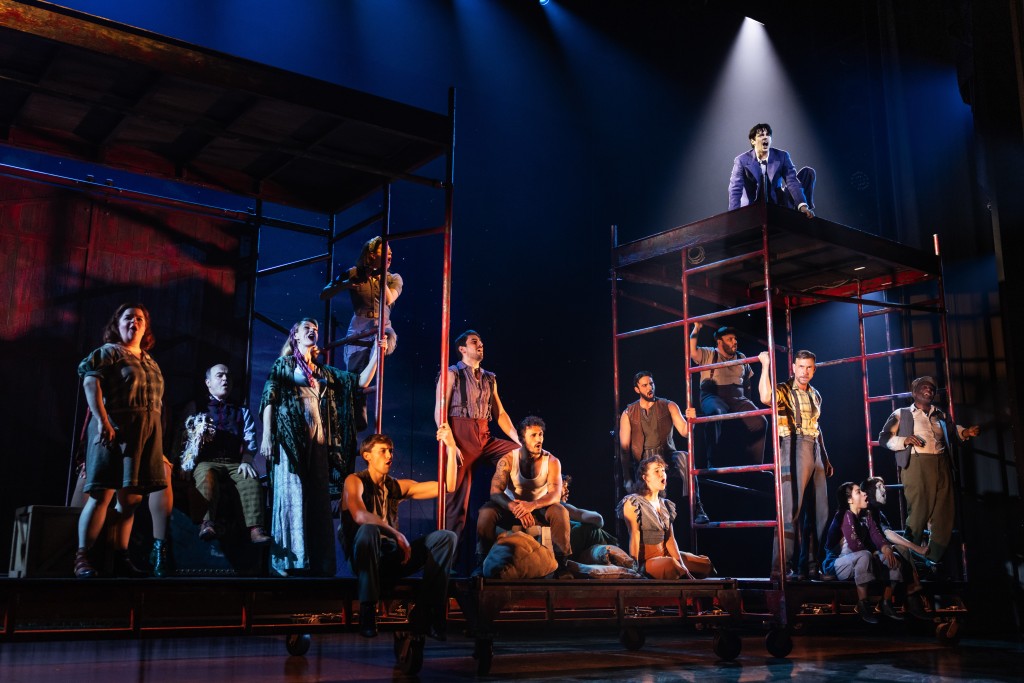
Based on the titular novel by Sara Gruen, Water for Elephants, excitingly directed by Jessica Stone, currently runs at the Imperial Theatre until September 8th. The production is a circus musical about redemption, love, courage and faith. With a book by Rick Elice and songs with a variety of dynamic musical styles and empowering lyrics by Pigpen Theatre Co., this is one of the finest, most rousing musicals to land its premiere on Broadway.
Water for Elephants richly incorporates the spectacle of the circus with stylistic artistry and well choreographed, impressionistic, acrobatic, aerial beauty. The company particularly embodies the spiritual essence of the beloved animals that are integral to the acts that barely keep solvent the foundering Benzini Brothers Circus, taken over by ringmaster/owner August (the excellent Paul Alexander Nolan).
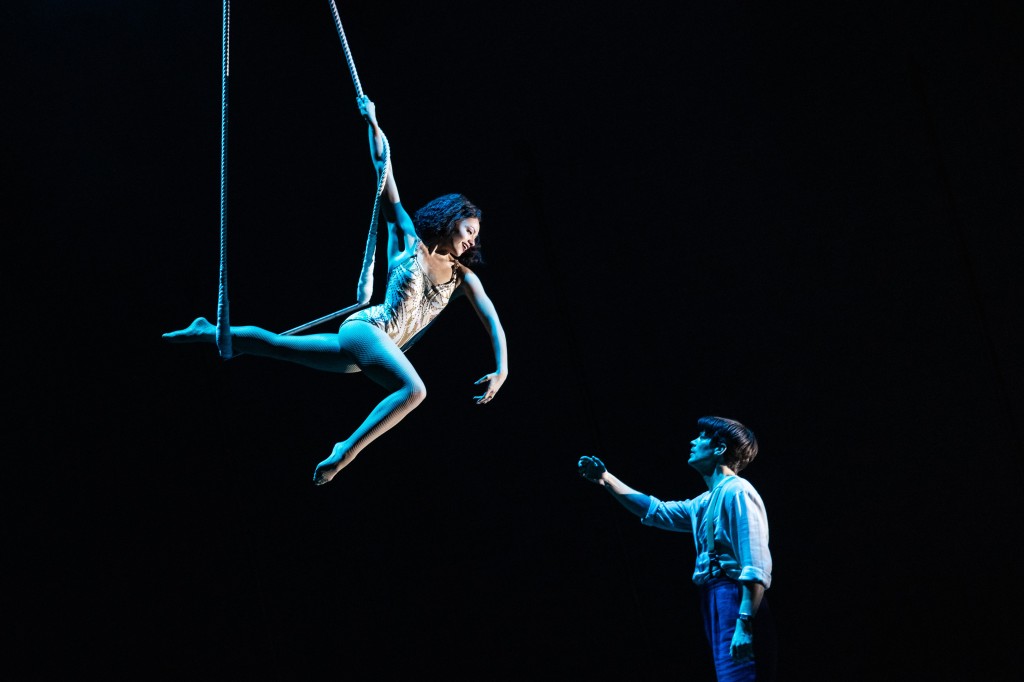
However, before the spectacle begins, at the top of the musical, a wizened, grey-haired, tall gentleman, Mr. Jankowski (the fine Gregg Edelman), appears. He is serenaded by ghosts of the past (Prologue) which remain obscure in our understanding until Charlie (Paul Alexander Nolan doubles in two roles), returns Mr. Jankowski to the present from his reverie, and Jankowski good naturedly comments that he enjoyed O’Brien’s One-Ring Circus. As June (Isabelle McCalla) and Charlie make sure everyone is packing up, a few turns of dialogue later, the elder gentleman comments that June’s horse could use “a stress test.”
Immediately, we realize that Jankowski’s knowledge is particular. And when he says he is there alone because his kids were too busy to come with him, and he’s escaped from the “home” and that will put the nurses in a tizzy, we are intrigued by what deep element in his psyche has brought him to this small circus. Affable and pleasant, Jankowski ingratiates himself with Charlie and June. Warmed up by his inside knowledge of circus jokes, Charlie says Jankowski can use his phone to call a cab to return him to the “home.” In the interim, June offers to show him around as they discuss his involvement in the circus of yesteryear and the differences between then and the present-day. Finally, Jankowski, a former animal vet, offers to look at the mare that “needs a stress test.”
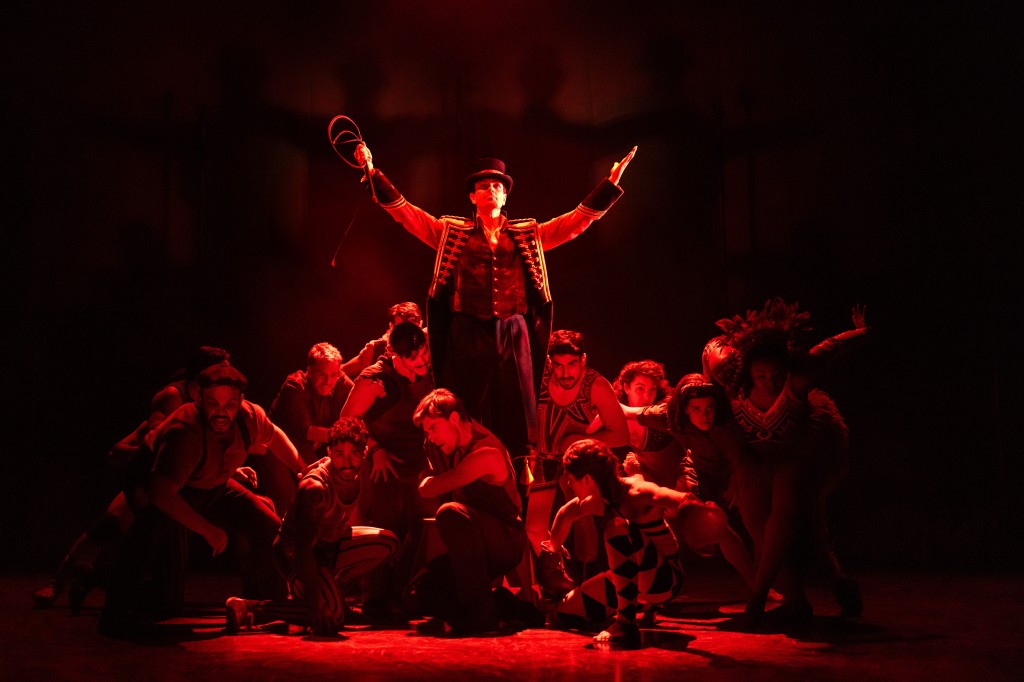
From this segue, the arc of development begins and Edelman’s Jankowski genially and intelligently narrates his involvement with the circus. As we move into the flashback, Edelman deftly walks us into the past. It is during the depression and Grant Gustin portrays Jacob Jankowski as a young man. In an amorphous scene of memory and voices, the older man sees his younger self reacting to the news of his parent’s death in a car accident, after which he was orphaned and left homeless. The powerfully voiced Gustin’s Jacob lives hand to mouth fending for himself. Hoping things will be better somewhere else, his destitution places him with other hobos on a train going wherever the wind blows them, (“Anywhere/Another Train”).
Jacob’s fellow riders Camel (Stan Brown) and Wade (Wade McCollum) are ready to throw him off this special train, but Jacob roundly stands up to Wade’s bullying aggression. Afterward, the two men who are roustabouts tell Jacob he hopped on a circus train and he can ride with them to the next town and stay for a day by making himself useful. There is fierce competition for every job, and he needs to distinguish himself to stay around permanently.
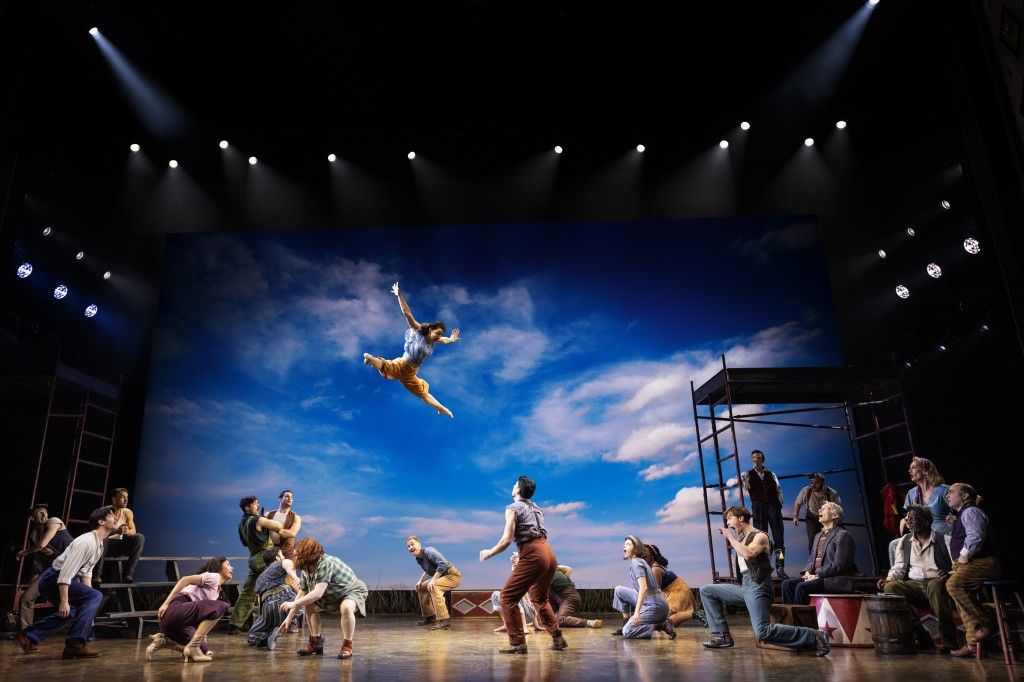
The stylized sets by Takeshi Kata in this scene of fast pacing movement are scaffolds on rollers which suggest a moving train with the help of the company, who create the bouncing motion which suits the rhythms of the music. Camel, who empathizes with Jacob, is the one who persuades Wade to allow him to stay for one day. Since Jacob elects to work with the menagerie, Camel tells him after they arrive in Utica and start setting up, he can earn his day’s keep by shoveling “s%$t.”
Director Jessica Stone and her creative team, which includes Shana Carroll’s circus design, Jesse Robb & Shana Carroll’s choreography with Mary-Mitchell Campbell & Benedict Braxton-Smith’s music supervision and arrangements, reimagine the interior, backstage world of the circus, of roustabouts, and the odd mix of personnel attracted to the nomadic, unique, showmanship of circus performance. In the musically synchronized “The Road Don’t Make You Young,” Jacob tours the circus and sees the insider’s scoop. The company of singers and acrobats swing mallets to stake the ropes for the Big Top and do daring twists and thrusts high into the air to commit muscular feats that take one’s breath away and rival the masters of Cirque du Soleil.
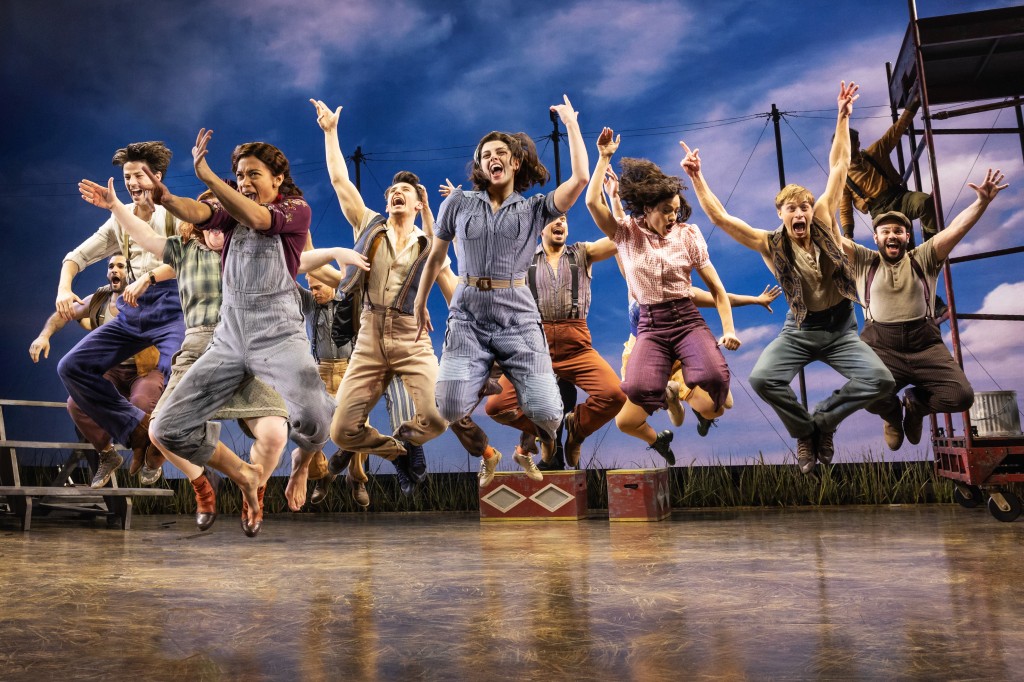
Jacob is nonplussed, figuring he will only stay one night, but is amazed to meet Agnes the Orangutan (Alexandra Gaelle Royer cutely re-imagines the reputedly smartest ape). Introduced to Barbara (Sara Gettelfinger), the mothering lead dancer of the “cooch tent,” Barbara tells him to get some grub and act as bouncer. Wade (August’s deadly right arm), renames her act to “Barbara and the Bally Broads,” and elevates them from the side show to the Big Tent to do “less strippen and more dippen.” Gettelfinger in a minor part plays it to the hilt.
As the song continues, Jacob, nicknamed Jake, also meets knife thrower and clown Walter (the humorous Joe De Paul), and Queenie his dog (a fluffy, long haired, hand puppet skillfully authenticated as a pooch by whomever “handles” her). By this juncture, Jake has met all those, who have been worn out by traveling the adventurous, road except the puppet master who keeps all in line. To conclude “The Road Don’t Make You Young,” owner August Rachinger presents himself center stage as the Broadway audience goes back in time to become the Benzini Brothers audience. In typical one-up-man ship razzle dazzle, Nolan’s ringmaster sings, “You wanna see something to set your spine tingling, something that blows Ringling out of the Ring?”
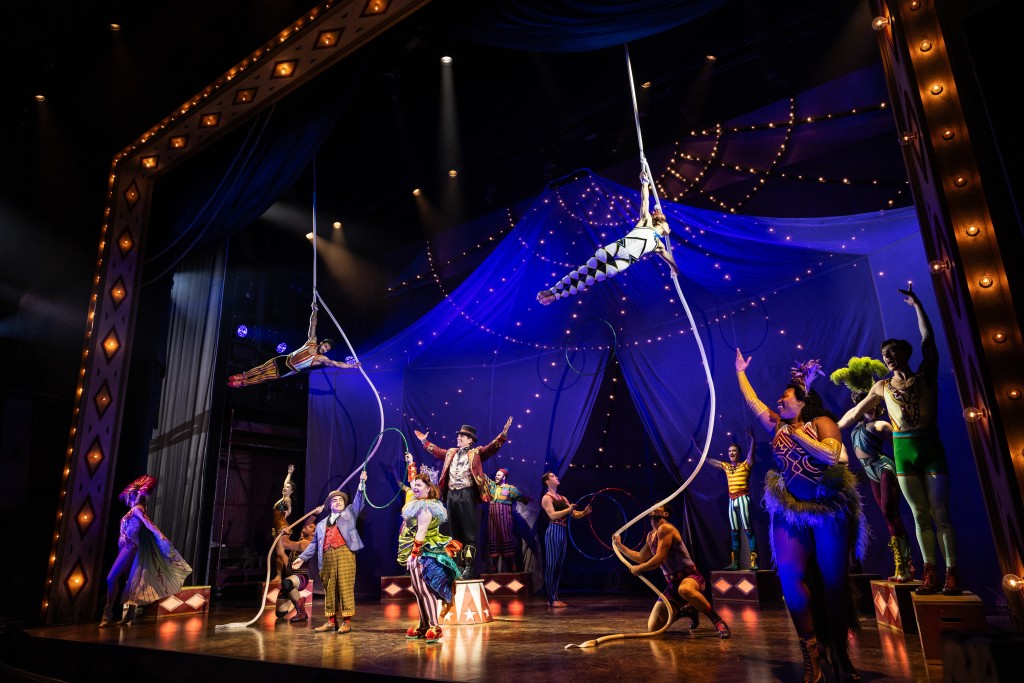
We question. Is he for real or just another blowhard exaggerating that chaff (the empty hull of a grain of wheat) is the meaty kernel of substance as he pretends his circus is finer than Ringling Brothers?
Unlike the quaint audience of the 1930s, who could not fathom black holes in space, television, quantum physics, cell phones, space stations orbiting the earth, Social Media and AI, we are the audience who experiences daily scientific wonders. What we’ve seen thus far on stage makes us understand August’s drive to be great in a time frame that is 90 years in the past before the dropping of the atom bomb. Additionally, we must consider that the parochial audiences of that time may rarely have seen a live lion.
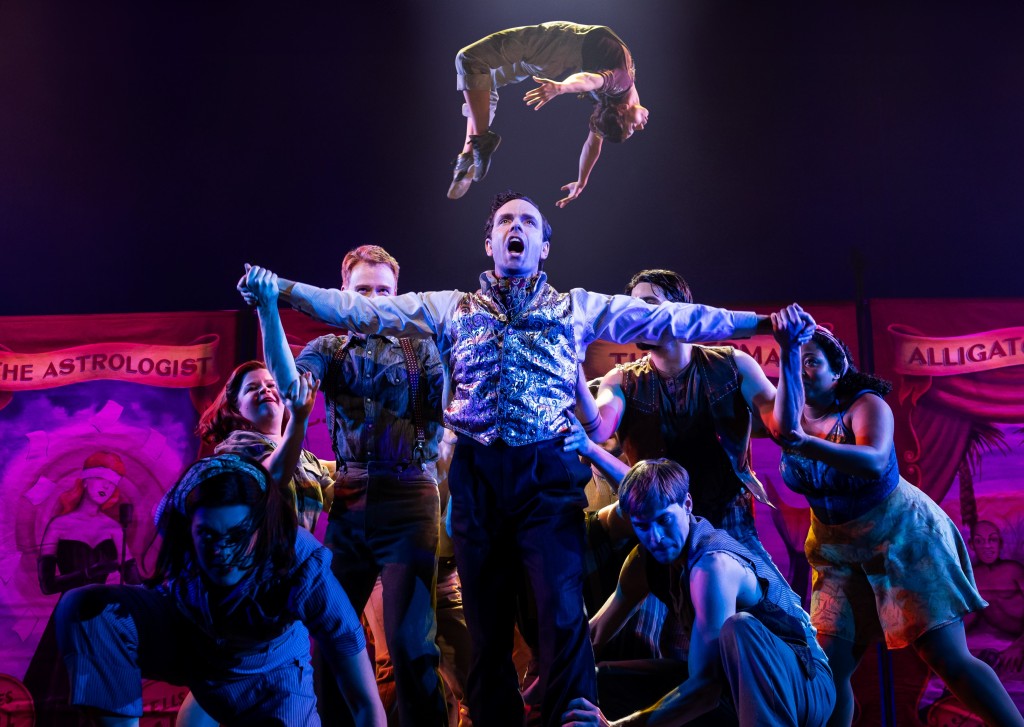
Our disbelief at August’s pronouncement is gradually suspended when the action moves back to the present with the elderly Jankowski. Charlie and June act amazed when he tells him that this circus was the famous Benzini Brothers of 1931. The crux of the story, how the foundering Benzini Brothers becomes THE Benzini Brothers of 1931, an outfit which made circus history, but not in a good way, is the substance of Jankowski’s tale.
The turning point for the circus and Jankowski’s narration begins at the encouragement of June and Charlie in the present. They want to know what happened. It is then Elice’s book returns us to the past, when Jake hears the limpid voice of Marlena (Isabelle McCalla also doubles as June). She coaxes and attempts to calm the ailing Silver Star (the horse she rides who brings in the crowds), out of his pain by singing, “Easy.”
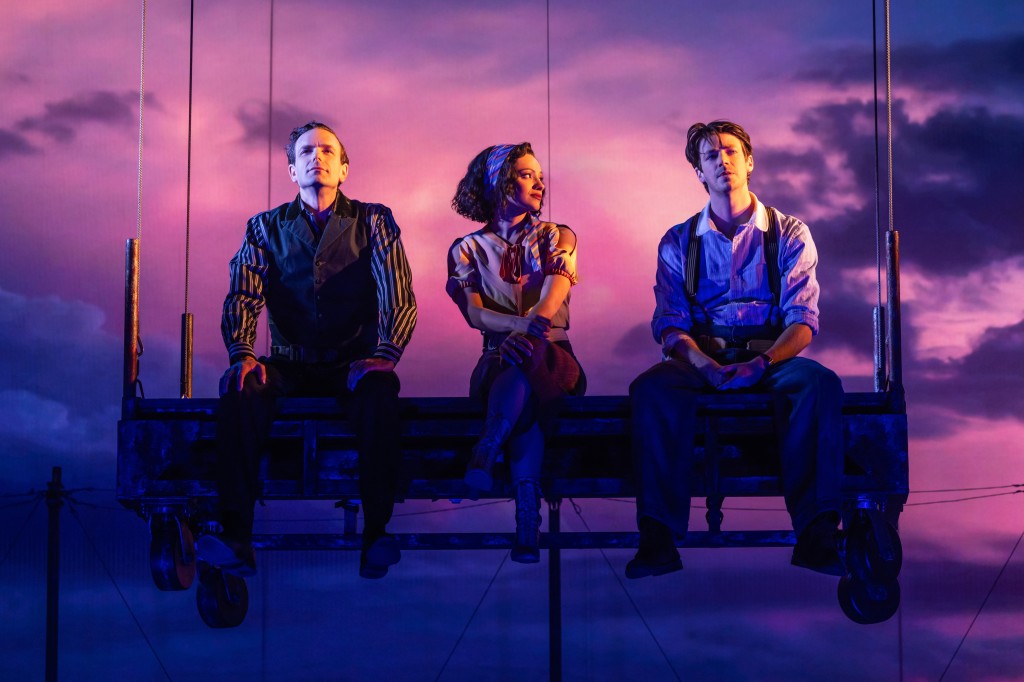
This is an exceptionally moving number as Antoine Boissereau infuses the agony of the horse with liquid movement aerially, as the white drapery flows with choreographed simplicity to effect his spirit struggle to stay alive despite his pained flesh. Jake is emotionally moved by Silver Star’s pain and the soulfulness of Marlena’s healing song. However powerful Marlena’s love is, Silver Star needs weeks of rest and recuperation to return to the center ring. If he doesn’t heal he will be lame, a death sentence for a star horse. Jake, uses the knowledge he has learned at Cornell as a vet, and his father’s experience as a vet. He tells August, who Jake finds out is Marlena’s husband, that the situation is dire for Silver Star.
August has him mercifully kill Silver Star which is a dramatic moment created by the Boissereau’s artistry. By that point August realizes Jake’s value and offers him a job. Jake avers because he realizes the pressure and tension he will be under having fallen for Marlena and having to live under the watchful and sinister monitoring of August whose behavior, at times is cruel and bellicose. When the train arrives too late at Wilkes-Barr, Pennsylvania where they try to get a replacement horse, they discover only Rosie is left for them to buy. August purchases her, and then is told she is an elephant, and they discover a truth her caretaker shares after purchasing her. She is one of the dumbest creatures anyone has ever worked with.
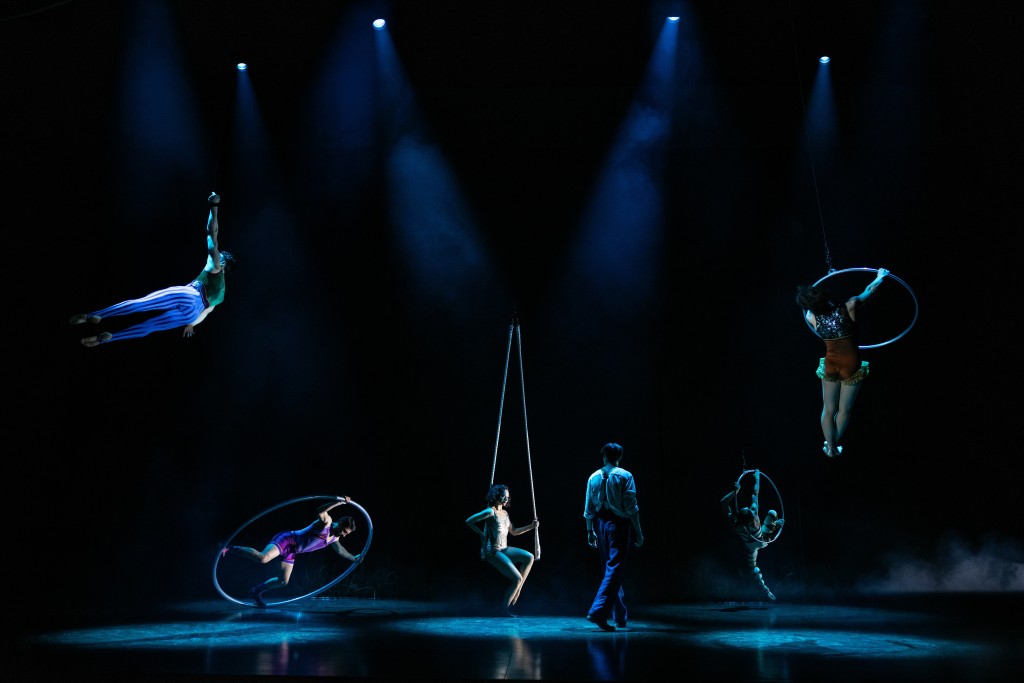
Humorously, not only has Jake fallen for Marlena, he falls for Rosie, who appears first as a trunk, then as various parts of an elephant in a clever “keep the audience wondering” if she will ever appear as the whole package. Interestingly, there is a meld of time, of present and past so that the elder Jankowski and Jake and Marlena sing the praises of Rosie (“Ode to an Elephant”) in another of Jankowski’s reveries.
With transformative hope, Marlena and Jake work together with Rosie as August suggests, while he sinisterly comments that Jake will never have Marlena and in effect threatens him away from her. Nevertheless, Rosie, Marlena and Jake work to try to get Rosie to do tricks with Marlena. In these sequences with Rosie the past is the present. Mr. Jankowski relives the hard work they go through with Rosie, who just doesn’t get much of what they are trying to teach her. (“Just Our Luck”) (“I Shouldn’t Be Surprised”)
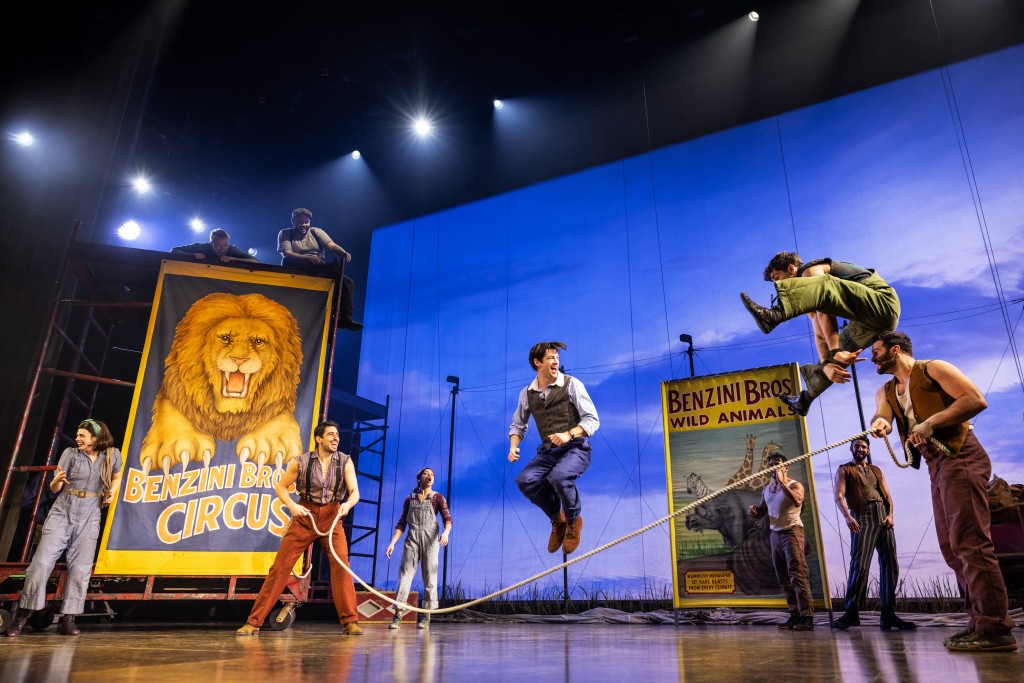
Meanwhile, if they can’t get Rosie in the center ring with Marlena as their main attraction, the circus which was foundering will completely fail. They need a miracle. Wisely, Stone teases the audience with what it wants to see, Rosie in full regalia as the beautiful elephant that all, including the company, have been singing about. Tantalized, we see the shadow of Rosie whole, but have to wait for her in fullness, until after the romance between Marlena and Jake blossoms in a kiss that happens almost unconsciously and whose “tell-tale” signs of lipstick alert Camel to warn Jake that he won’t be able to handle the trouble August will bring upon him for stealing the affections of his wife. Likewise, Barbara warns Marlena off Jake. However, both cannot help themselves.
Despite Marlena not getting Rosie properly trained for her star performance, August pushes the issue because they are desperate for the money the act will bring. In “The Grand Spec” Nolan’s August and the company superbly whip up the crowd as we anticipate seeing Rosie do “her thing.” When he is left standing with no stars emerging, the humiliated August runs backstage and attacks Rosie and beats her, trying to get her to move. We hear her pained trumpeting cries, and then she defends herself and knocks down August. She is ready to stomp him when the miracle happens.
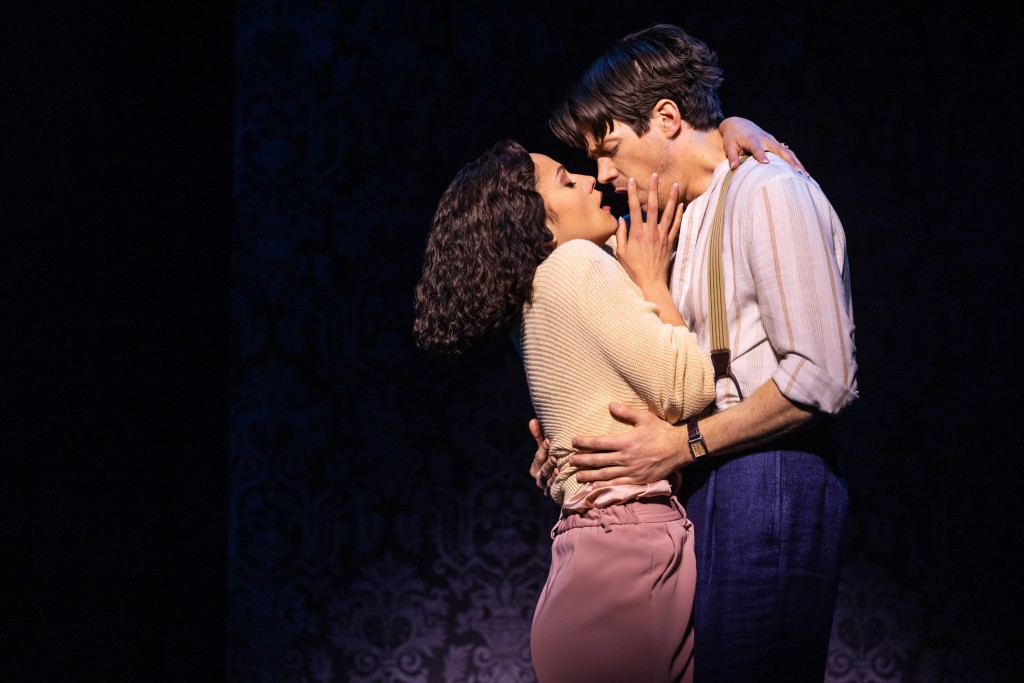
Jake in the twinkling of an eye reacts and Rosie stops herself from killing August whom she hates. The day is saved and the audience finally sees Rosie in full form. She is awesome in all her glorious, sensitive puppetry thanks to Caroline Kane, Paul Castree, Michael Mendez, Charles South and Sean Stack. “The Grand Spec” concludes and August finally becomes what he’s dreamed of being, the proud, successful “ringmaster extraordinaire.”
However, this achievement is at great cost, for he realizes he has harmed his relationship with his wife. Jake’s success with Rosie and August’s own cruelty and jealously have pushed Jake and Marlena together. She hugs Jake celebrating their success. Though she blows August a kiss, his inferiority and insecurity make him feel the loser. Nothing she can say and do will arrest his thoughts that Jake and his wife are lovers, though nothing but a kiss and hug has happened between them.
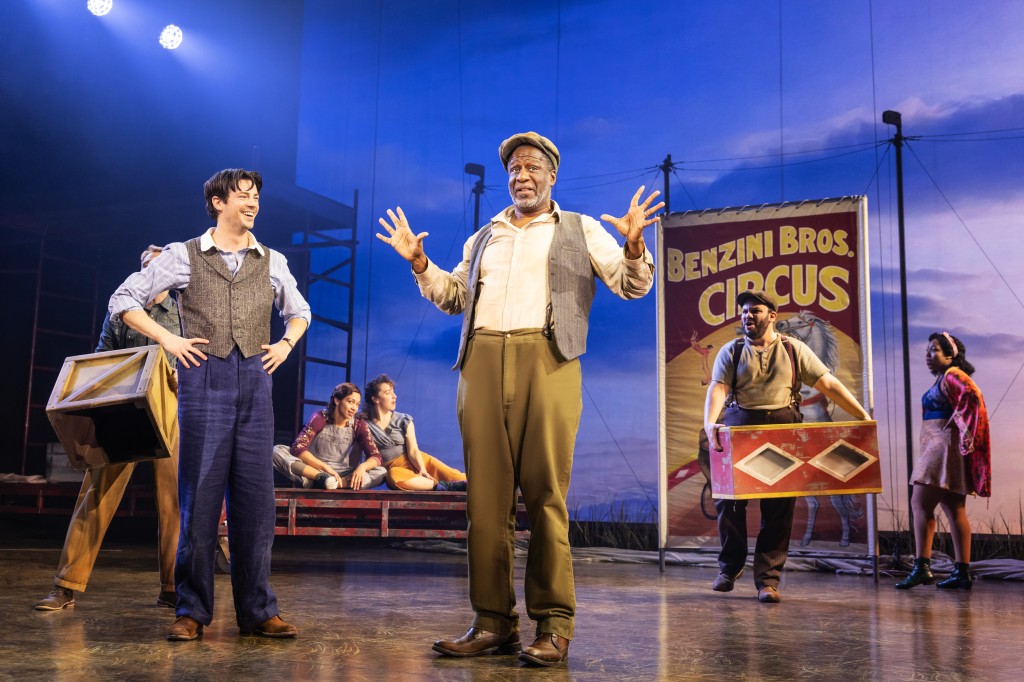
Thus, one problem is solved, however, unchecked psychologically, August, who should be thrilled with Rosie and Marlena’s sensational act, is driven toward distrust and anger. He drowns in his own bitterness that the reason why the act with Rosie is a success is because of, Jake, who has become invaluable.
Act II unfolds as the conflicts increase among August’s circus people and himself as well as August, Rosie, Marlena and Jake. In the first act we have a clue to August’s character (“The Lion Has Got No Teeth”); he feels he is a worthless fake. Though he glories in it and embraces his lies, this attitude does nothing to uplift him. August allows his envy of Jake, who is his superior in attitude, personality, education and kindness to animals, to be his undoing. Instead of realizing Jake and Marlena love each other and it’s time to move on, his cruelty and thuggery (we see how Wade, his lackey, acts out August’s evil wishes) cause him to seek vengeance. This spills out onto others in his company, and we note that he becomes so loathsome, that he cannot even stand himself.
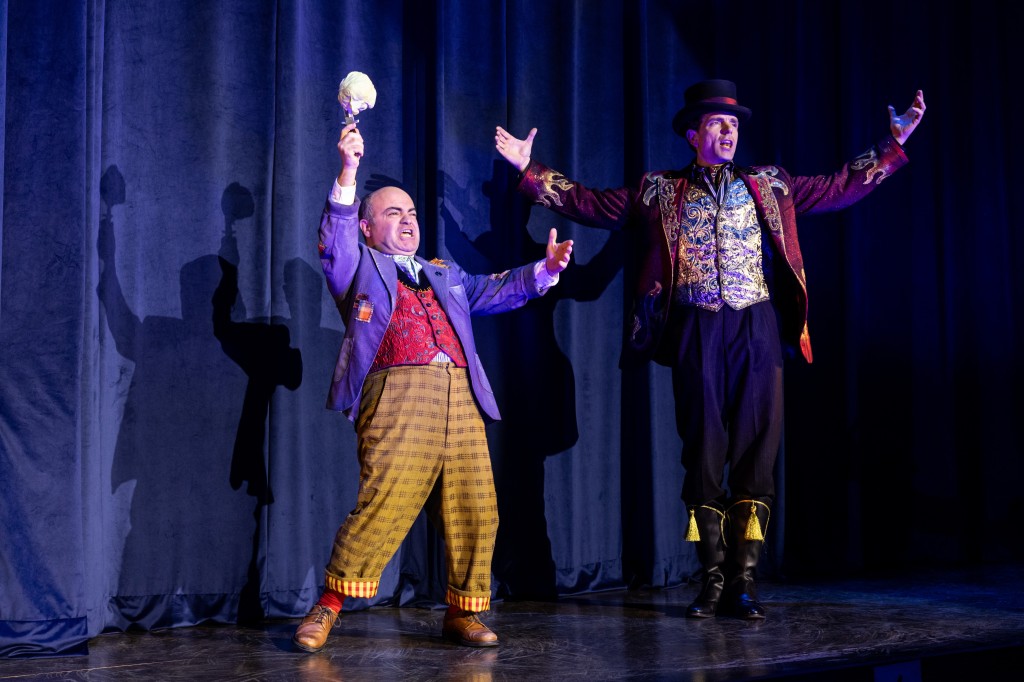
Nolan is the perfect, nuanced villain that we can understand because Elice’s characterization gives the actor so much to work with. Likewise, with the other characters who are strongly portrayed in song i.e. (“I Choose the Ride”), a song which Camel leads beautifully, we understand the choices the characters make. These ultimately lead to their victimization by August who becomes more and more tyrannical and vengeful without good reason. How he moves against Walter and Camel is terrifying, and McCollum’s Wade haplessly allows himself to be ill-used and exploited by August.
Once more we are reminded that evil flourishes because potentially good people do nothing to stop it. In Wade’s instance, he services August’s wickedness for his own purposes, willingly becoming his slave.
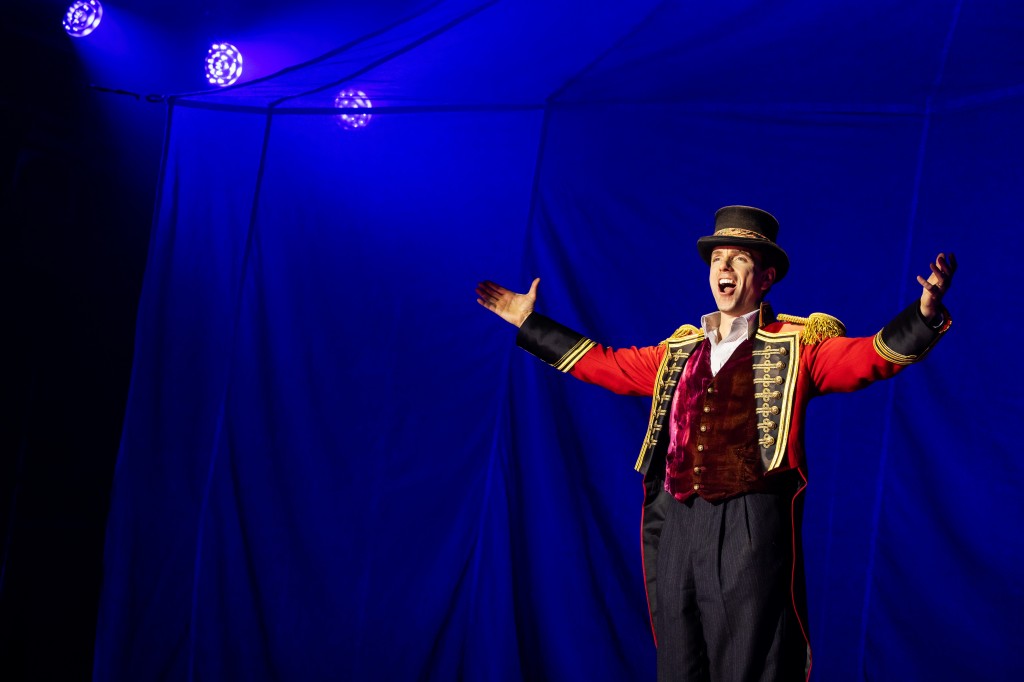
The energy and enthusiasm of the acrobatic dancers of Act I are even greater in Act II. Importantly, their action arises organically from the sequence of events that occur. Nothing the creative team does seems extraneous or out of place in the circus world. And it is a delight to watch their expertise and phenomenal talents singing, dancing and doing exploits during the various musical numbers which range from jazz, country, blues, ballads and more. The score and complex lyrics by Pigpen Theatre Co. have been reworked, honed and refined to precision.
This is one to see for the outstanding performances, the acrobatics and aerial spectacle which are extraordinary. The circus design makes sense in Stone’s creation of a small-time circus of 1931, run by a flawed ringmaster who attempts to keep things together, despite his interior brokenness. The director’s staging capture’s the novel’s ethos and heightens all the characters’ vulnerabilities. August’s failings make him the perfect foil for cruelty and exploitation. His darkness is made all the more evident in contrast to Jake, who in every way is his opposite, especially in his humility, gentility and decency.
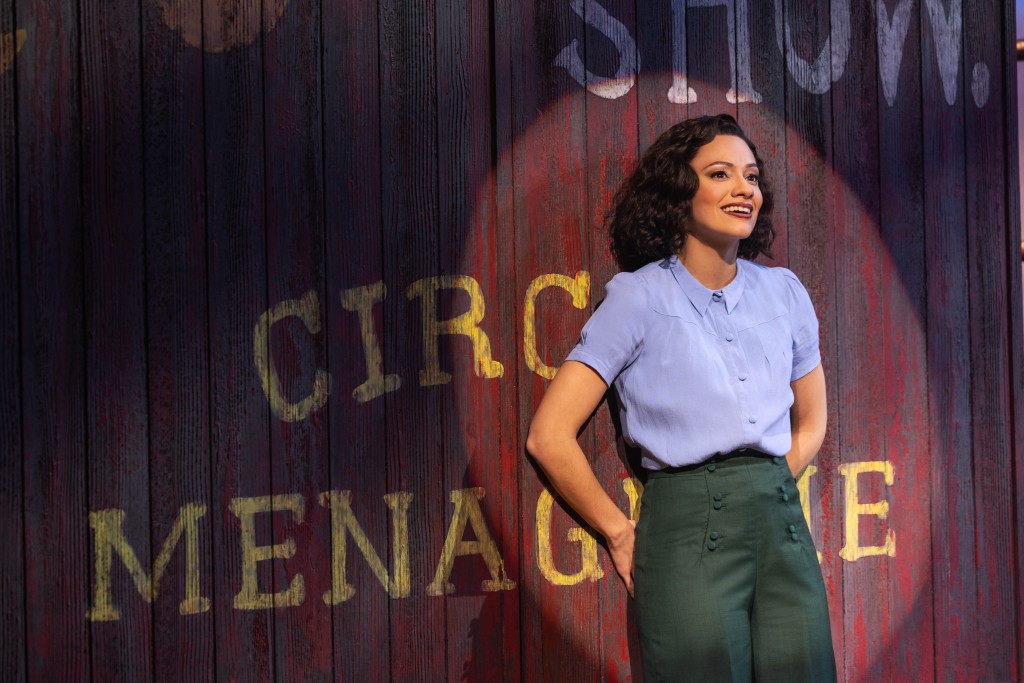
There is one scene taken out of Victor Hugo’s novel Les Misérables, which clues in the differences in the soul conflict and morality between August and Jake. Jake has the opportunity to kill August while the ringmaster sleeps. His goodness wins out and he stops himself. It’s a marvelous inclusion in an intricately woven, profound musical about individuals pressed by circumstances toward the abyss, until they free fall into their own inevitable demise.
Kudos to those not mentioned above which include David Israel Reynoso’s costume design, Bradley King’s lighting design, Walter Trarbach’s sound design, David Bengali’s projection design, Campbell Young Associates’ hair & wig design and Ray Wetmore & Jr. Goodman, Camille Labarre’s puppet design. Finally, the music was compelling thanks to Daryl Waters, Benedict Braxton-Smith, August Eriksmoen’s orchestrations, Music Director, Elizabeth Doran and Music Coordinator, Kristy Norter.
Water for Elephants. Imperial Theatre, 249 West 45th Street, between 7th and 8th. 2 hours forty minutes with one intermission until September 8th. https://www.waterforelephantsthemusical.com/
‘The Prom,’ A Musical Comedy That Soars With Positivity and Truth

The cast of ‘The Prom,’ Book by Bob Martin & Chad Beguelin, Music by Matthew Sklar, Lyricsy by Chad Beguelin, Directed and Choreographed by Casey Nicholaw (Deen van Meer)
Even if you never went to your own high school prom and can’t imagine wanting to, The Prom directed and choreographed by Casey Nicholaw, currently at Broadway’s Longacre Theatre is a celebration of joy and life that you would be comfortable with. In fact just for its sheer hilarity, exuberance, and wisdom, you would eagerly sign up for the high school prom decorations committee. From its timing-perfect acting, to the evolution of characterization, and ingenious “true-to-life” story-line delivered in dialogue with dollops of zazzzzz, this musical comedy is thematically trenchant and expansive. Thanks to its talented creatives who know how to please and bring in the jokes at two hours and change with one intermission. The Prom is saavy, poignant and politically current with immutable themes that resonate for all time.
The notion of a “prom” unifying a senior class for the last time before they take off to “parts unknonwn” beyond the cliff of their community, is antiquated. But it is a tradition that the “in” crowd and “cool” kids in various schools in the US of course exploit to champion their supremacy over the rest of the school’s social groups. Naturally, for girls it is the height of achievement to be able to go with a date and buy a gorgeous dress with all the trimmings including matching color co-ordinated cumberbund for the guy’s tux and baseball cap. For those outcasts and isolates who have had to endure the humiliation and often sub rosa bullying and excoriation of their classmates precisely because they are “EWWWWW,” and would never be able to either ask someone or be asked, “the prom” is synonymous with pain, torment, Nazi-style fascist sadism which ultimately reverts to self-flagellation for the isolate’s not measuring up and having one’s place on the sunny side of high school superiority and popularity.

‘The Prom,’ Book by Bob Martin & Chad Beguelin, Music by Matthew Sklar, Lyricsy by Chad Beguelin, Directed and Choreographed by Casey Nicholaw (Deen van Meer)
The high school structure of placing students in same-age-related grades causes such emotional debacles and crucibles of misery, not only with regard to “the prom,” but with regard to stratification of achievement levels and every aspect of the daily life of the high school student. But what happens if you are not only a social outcast, but one with a gender proclivity that is UBER “EWWWW” in a setting where religious folks in a Red state culture believe your very nature, identity and being is a sin? Such is the conundrum and very real stakes for Emma (sensitively and realistically portrayed by the golden-voiced Caitlin Kinnunen) As a high school senior of a small high school in Indiana, Emma must suppress her year and one-half relationship with Alyssa (Isabelle McCalla is superb as Emma’s waffling sub rosa girlfriend) which they both intend to make manifest when they go to their prom together. But when the PTA led by Alyssa’s mom (the heartfelt and many-sided Courtenay Collins) discovers that Emma intends to bring a same sex girlfriend (she does not know it is her daughter-surprise, surprise), she protests and creates a ban. And Emma protests creating a stir.
This real-life situation of gay teens being barred from attending their proms with same sex partners has occurred all over the US and as recently as in 2017, Buffalo, New York. Most specifically when it happened to Constance McMillen of Itawamba Agricultural High School, in Mississippi, McMillen sued because her rights were violated. And when the ban was lifted and she attended her scheduled prom, the district had a surprise waiting for her right out of Mitch McConnell’s and the Republican Party’s playbook. (Check this article on McMillen.)
With Trumpism, gender discrimination, misogyny, racism and nativism have gained a legitimacy as certain social groups glance back fondly to the days of Jim Crow and attempt to enforce their fascist agenda on the rest of US citizenry who are patriots and believe in upholding the constitution. That Bob Martin, Chad Beguelin and Matthew Sklar have allowed the prom banning of LGBTQ groups to inspire them to write a musical comedy which explores the heights and depths of Trumpist-type discriminatory acts with grace, style, laugh-riot humor and profound wisdom (without making reference to Trump, or the new Trump party) is prestidigitation on a grand scale. For they inspire unity, hope and love with the same tools that adversarial groups use to promote hate and division.
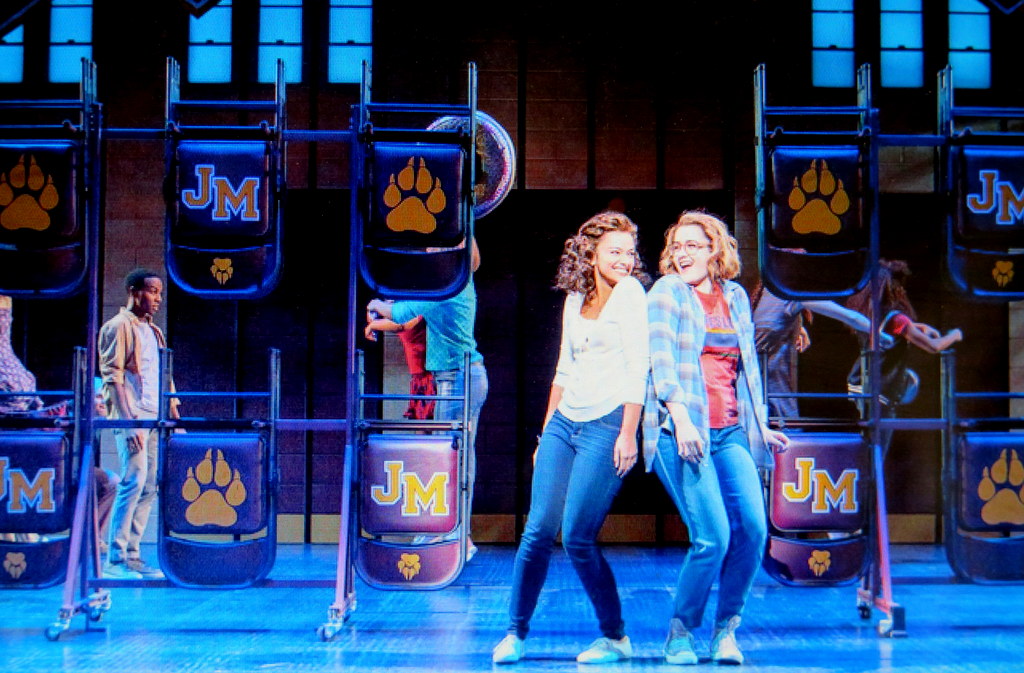
(L to R): Isabelle McCalla and Caitlin Kinnunen in ‘The Prom,’ Directed and Choreographed by Casey Nicholaw,(Deen van Meer)
And what is the vehicle they use to initiate a way into the LGBTQ hair-raising problems of a small Indiana high school and Emma’s fight? Theatricals! Thespians who represent some of the finest, award-winning celebrity narcissists on Broadway. And these even bring their Tonys and Drama Desks to impress the motel manager to give them a better room. Of course, not only are they not recognized, the crushing humiliation they experience in a town that could care less about them is enough to make even a narcissist more lovable and heart-warming.
Martin, Beguelin and Sklar begin in New York City with the Broadway stars backstage after a performance which closes immediately when they receive a horrific New York Times review. The critic was particularly humiliating when they referred to the headliners as “unlovable narcissists.” The joke is priceless for it recalls another celebrity narcissist who also cannot be insulted and refuses to change.
The narcissists are the fabulous Beth Leavel as Didi Allen the Diva Queen extraordinaire with a gorgeous belt (We hear it in the song “The Lady’s Improving), and her co-star in infamy the “bring-down-the-house” high flier, Brooks Ashmanskas as Barry Glickman whose vibrant and hysterical “Barry is Going to the Prom,” hints at the 30-years-ago miseries of high school and the affirmation of love wiping tears away years later.

The Prom,’ Cast and Christopher Sieber, Book by Bob Martin & Chad Beguelin, Music by Matthew Sklar, Lyricsy by Chad Beguelin, Directed and Choreographed by Casey Nicholaw (Deen van Meer)
The attention starved thespians are accompanied by Angie (the excellent Angie Schworer whose dance/voice number “Zazz” is just wonderful) and Trent Oliver (Christopher Sieber’s fantastic “Love Thy Neighbor” with the ensemble is the gobsmacking point of the show). Along with producer Sheldon Saperstein (Josh Lamon’s timing is spot-on) this motley crew goes on the road to resurrect their brand, recover from the criticisms in the Times article by battering down the unjust doors of the discriminatory high school to join Emma’s cause. They determine that this “self-less act” of “making a difference,” “doing good for the world” will lift their reputations and give them some positive publicity.
Of course they exacerbate the horror of the initial situation for Emma and create a chaotic shambles riling up the parents of the PTA who demand the interlopers be removed and leave. When Emma succeeds in her lawsuit proving her civil rights cannot be violated, the PTA and student body contrive a solution, represented by the song “Tonight Belongs to You/Us” sung by the ensemble at the end of Act One. The number is mesmerizing, wildly frenetic (the dance moves are spectacular) and enthralling. And then the chill comes to us in a terrifying realization of the song’s true message sung by a predatory, vampirish-sounding refrain “the night belongs to us.” Clue, the cool crowd, the money, the power players who attempt to devour and suck the blood of the little people who suffer their callous and unconstitutional injustices. Emma’s Broadway “helpers” prove anything but and Emma is worse off than before the show crowd showed up!
This is a superior high point to end Act One, for there must be change; such injustice cannot continue. Enter the answer which turns the religious institutional crowd on its ear and enter artistic empathy. The result is a beautiful cathartic Greek style elevated comedy of triumph in Act Two which provides a more than satisfying and very adult addendum to proms everywhere in the US.
Yes, some of the problems are not resolved, just like in life. And the townspeople still must grapple with their prejudices. These have taken years to simmer and boil and do not retreat overnight. Alyssa’s mom Mrs. Green must confront the pain of a truth she doesn’t want to see with her daughter. The hatreds and bullying will continue, but this hiatus of joy has begun to ameliorate it. Ironically, the ones who have benefited greatly (the celebrity narcissists) have stepped up and contributed their grist to making the prom one that everyone will remember. Interestingly, they have evolved and developed into less self-absorbed individuals who perhaps have begun to understand another level of success beyond the wins they’ve received in their careers.
I loved this show for its incredibly energetic performances by all of the cast and the ensemble. There is not one who isn’t superb or who isn’t “on point” and “moment-to-moment.” I loved the book and the accompanying musical numbers which remain insightful and carry the themes and story-line forward to the powerful message of the show. Indeed, some of the songs are stand alones with lovely melodies and rising lyrics: “Dance With You,” and “Unruly Heart,” are especially meaningful.

Beth Leavel, Brooks Ashmanskas and the Cast in ‘The Prom,’ Book by Bob Martin & Chad Beguelin, Musi by Matthew Sklar, Lyrics by Chad Beguelin, Directed and Choreographed by Casey Nicholaw (Deen van Meer)
The Prom presents the realms of hope and faith in people’s goodness. It encourages us to take a stand for what is right regarding human dignity, respect and decency. Without politicizing or rankling, it cleverly portrays elements of our nation’s weaknesses from the self-absorbed celebrity elite, to the equally self-absorbed and self-righteous conservatives. Both must modify and one way this will occur is for each social group of the nation to come together, get out of their comfortable locations and visit the hinterlands or “sin city.” The production makes a case for laughing at oneself and not taking one’s beliefs too seriously to forget the dignity of others, regardless of their beliefs. And perhaps especially because of their beliefs, they must be given a hearing. How many times must we say this to begin to do it? We need to stop cannibalizing ourselves.
The final song “It’s Time to Dance,” argues for each and every one of us to be our own creations, to define ourselves to be as truthful as possible on journeys of grace and openness, and without arrogance that masks fear or belligerence to “prove” a point.
The production is superb in its thematic encouragement/reinforcement for young and old: 1)to be the best of who one can be; 2)to take charge of one’s own life and not wait for others to act for us; 3) to bravely do one’s part to establish a world of tolerance and inclusion through communication and empathy.
The creators are not presenting ideas that are puerile and simplistic. If one just stops for two minutes and considers the rise of white terrorist incidents in the last two years that go against the fabric of our nation’s tenets, then one realizes how much our culture needs to witness these themes again and again. On the surface The Prom is a fun ride and you leave the theater humming the songs. But underneath the laughter and fun is the poignant message expressed with ebullience by the ensemble and Christopher Sieber’s Trent Oliver with rousing spirits in the song, “Love Thy Neighbor.” If only…but for the shining last quarter of the show, the cast convinces us of the truth and possibility of putting aside behaviors that divide. What a crazy great message that all of us imperfect, flawed individuals need to remember to dance at our own “prom” (our own way of walking) every day and invite a host of other smiling individuals to promenade with us!
Kudos go to the artistic team which makes this production a resounding you want to come back to see a few times: Jack Viertel (Original Concept) Scott Pask (Scenic Design) Ann Roth (Costume Design) Matthew Pachtman (Costume Design) Natasha Katz (Lighting Design) Brian Ronan (Sound Design) Josh Marquette (Hair Design) Milagros Medina-Cerdeira Mary-Mitchell Campbell (Music Supervisor, Vocal Arrangements) Larry Hochman (Orchestrations) Meg Zervoulis (Music Director) and John Clancy, Glenn Kelly and Howard Joines for their musical coordination, additional orchestrations and arrangements.
The Prom (Longacre Theatre on West 48th between 7th and 8th) has one 15 minute intermission. You can purchase tickets by CLICKING HERE.